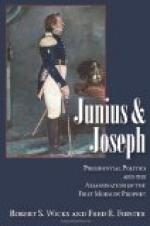The elder Croom sat in his place. He was burly and ruddy, a wholesome man, very silent, very strong, a person to be feared and relied on. Ephraim believed that force went forth from his father’s presence like perfume from a flower. There were many kinds of flowers whose perfume was too strong for Ephraim, but he felt that to be a proof of his own weakness.
Martha Croom, also of New England stock, was of a different type. At fifty years she was still as slender as a girl—tall and too slender, but the small shapely head was set gracefully on the neck as a flower upon its stalk. Her hair, which was wholly silvered, was still abundant and glossily brushed. Her mind was not judicial. She was more quick to decide than to comprehend, full of intense activities and emotions.
“I have heard,” said the preacher slowly, “certain distressing rumours concerning—”
Mrs. Croom gave an upward bridling motion of her head, and a red spot of indignant fire came in each of her cheeks. “Joe Smith?”, she cried. “A blasphemous wretch! And there is nothing, Mr. Finney, that so well indicates the luke-warmishness into which so many have fallen as that his blasphemy is made a jest of.”
Ephraim moved uneasily in his chair.
Mr. Croom made a remark brief and judicial. “The Smiths are a low family.”
Mrs. Croom answered the tone. “If the dirt beneath our feet were to begin using profane language, I don’t suppose it would be beneath our dignity to put a stop to it.”
“It is the Inquisition that my mother wishes to reinstate,” said Ephraim.
The master of the house again spoke with the naivete of unquestioning bias. “No, Ephraim; for your mother would be the last to interfere with any for doing righteousness or believing the truth.”
Mrs. Croom’s slender head trembled and her eyes showed signs of tears at her son’s opposition. “If God-fearing people cannot prevent the most horrible iniquities from being practised in their own town, the laws are in a poor condition.”
“You have made no candid inquiry concerning Smith, mother; your judgment of him, whether true or false, is based on angry sentiment and wilful ignorance.”
The preacher sighed. “This Smith is deceiving the people.”
“His book,” said Ephraim, “is a history of the North American Indians from the time of the flood until some epoch prior to Columbus. It would be as difficult to prove that it was not true as to prove that Smith is not honest in his delusion. We can only fall back upon what Butler would call ‘a strong presumption.’”
Mrs. Croom, consciously or not, made a little sharp rap on the table, and there was a movement of suppressed misery like a quiver in her slender upright form. Her voice was low and tremulous. “If you’d got religion, Ephraim, you wouldn’t speak in that light manner of one who has the awful wickedness of adding to the words of the Book.”




